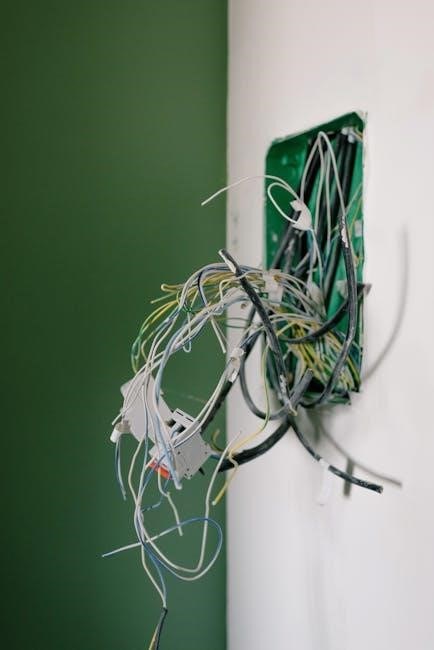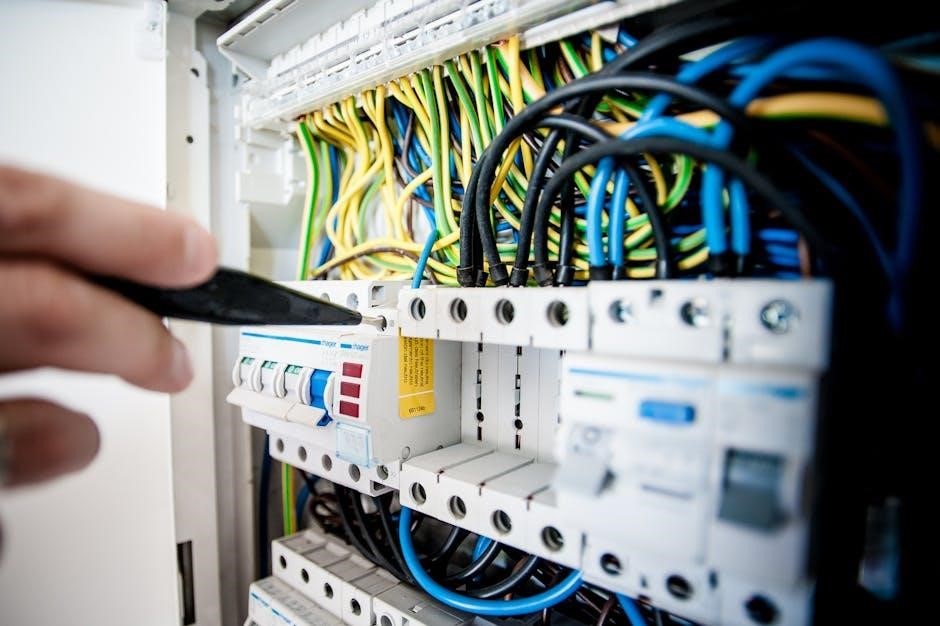Regular maintenance is essential for preserving the performance, reliability, and longevity of your Nissan․ This guide outlines Nissan’s service intervals, cost-effective solutions, and expert care tips to ensure your vehicle runs optimally․ Schedule regular check-ups with authorized Nissan dealers for professional assistance and genuine parts․
1․1 Importance of Regular Maintenance for Nissan Vehicles
Regular maintenance is crucial for ensuring the performance, longevity, and safety of your Nissan․ It prevents costly repairs by addressing issues early and maintains your vehicle’s reliability․ Proper care extends the lifespan of components, enhances fuel efficiency, and ensures optimal functionality․ Additionally, regular maintenance preserves the value of your Nissan and keeps it running smoothly․ Always follow Nissan’s recommended guidelines and use genuine parts to guarantee safety and efficiency․ By prioritizing maintenance, you protect your investment and ensure a trouble-free driving experience for years to come․
1․2 Overview of Nissan’s Maintenance Schedule
Nissan’s maintenance schedule is designed to ensure your vehicle runs efficiently and safely․ It recommends services at specific intervals, such as every 5,000 to 7,500 miles, depending on driving conditions․ Regular checks include oil changes, tire rotations, and fluid inspections․ The schedule is tailored to your vehicle’s configuration and usage, offering flexibility for varying driving habits․ By following Nissan’s guidelines, you can prevent unexpected issues, maintain performance, and extend the lifespan of your car․ Proper adherence ensures compliance with warranty terms and keeps your Nissan in optimal condition for years to come․

Understanding Nissan’s Maintenance Schedule
Nissan’s maintenance schedule is personalized based on your vehicle’s configuration, mileage, and driving conditions, ensuring optimal performance and preventing potential issues through timely service recommendations․
2․1 Recommended Service Intervals
Nissan recommends regular service intervals to ensure optimal vehicle performance and longevity․ Typically, vehicles should be serviced every 5,000 to 7,500 miles or every 6 months, depending on driving conditions․ For example, oil changes are suggested every 5,000 miles, while tire rotations and brake inspections are recommended every 15,000 miles․ More comprehensive checks, such as fluid replacements and belt inspections, are advised at 30,000-mile intervals․ Following these intervals helps maintain warranty compliance, prevents unexpected repairs, and ensures your Nissan runs smoothly for years to come․
2․2 Mileage-Based Maintenance Requirements
Nissan’s maintenance requirements are tailored to specific mileage intervals to ensure your vehicle remains in peak condition․ At 30,000 miles, essential services like oil changes, tire rotations, and brake pad inspections are recommended․ By 60,000 miles, additional checks such as belt replacements and fluid flushes are necessary․ Regular adherence to these milestones prevents wear and tear, ensuring reliability and safety․ Following Nissan’s mileage-based schedule helps maintain your vehicle’s health and prevents costly repairs down the road․
2․3 Time-Based Maintenance Recommendations
Nissan recommends regular maintenance based on time intervals to ensure optimal vehicle performance․ Every 6 months or 5,000 miles, essential checks like oil changes, tire pressure, and inspections should be performed․ Annual services include detailed inspections of battery health, fluid levels, and belts․ Following these time-based recommendations helps detect potential issues early, preventing costly repairs․ Nissan’s schedule is designed to adapt to various driving conditions, ensuring your vehicle remains reliable and efficient over time․

Essential Maintenance Services for Nissan Vehicles
Regular oil changes, tire rotations, and brake inspections are vital to maintain your Nissan’s performance and longevity․ These services ensure safety, efficiency, and prevent costly repairs․
3․1 Oil and Filter Changes
Oil and filter changes are critical for maintaining your Nissan’s engine health․ Nissan recommends oil changes every 5,000 to 7,500 miles, depending on driving conditions․ Using genuine Nissan oil and filters ensures optimal performance, fuel efficiency, and engine longevity․ Regular changes prevent engine damage, reduce friction, and keep your vehicle running smoothly․ Always refer to your owner’s manual for specific intervals and guidelines․ Certified technicians at Nissan service centers can perform this service efficiently, ensuring your vehicle remains in top condition․
3․2 Tire Rotation and Pressure Checks
Regular tire rotation and pressure checks are vital for ensuring even tread wear, improved fuel efficiency, and enhanced handling․ Nissan recommends rotating tires every 5,000 to 8,000 miles to maintain balanced performance․ Check tire pressure monthly and before long trips, using the pressure specified in your owner’s manual․ Properly inflated tires reduce wear, improve safety, and optimize vehicle performance․ Uneven tread wear can indicate misalignment or improper rotation, so inspect tires during maintenance․ Maintaining correct tire pressure and rotation schedules helps extend tire life and ensures your Nissan drives smoothly and efficiently․
3․3 Brake System Inspection

Regular brake system inspections are critical for ensuring safety and performance․ Nissan recommends inspecting brake pads, rotors, and fluid levels every 10,000 to 15,000 miles․ Look for worn pads, warped rotors, or fluid leaks, as these can compromise braking efficiency․ Proper maintenance ensures consistent stopping power and prevents costly repairs․ Always use genuine Nissan parts for replacements to maintain reliability․ Addressing brake issues promptly enhances safety and maintains your vehicle’s optimal performance․ Schedule inspections with certified technicians to ensure your Nissan’s brake system functions flawlessly under all driving conditions․
3․4 Battery Health Check
A battery health check is vital to ensure reliable starting and electrical system performance․ Nissan recommends inspecting the battery every 6 months or 5,000 miles․ Check terminals, cables, and connections for cleanliness and security․ Test battery charge levels and connections for corrosion or wear․ Extreme temperatures and driving habits can affect battery life․ Replace the battery if it shows signs of weakness or age․ Always use genuine Nissan parts for replacements to maintain optimal performance and reliability․ Regular checks prevent unexpected failures and ensure your vehicle starts effortlessly in all conditions․

Nissan Maintenance Cost Estimates
Nissan vehicles average around $7,407 in maintenance and repair costs over the first 10 years, with a 21․32% chance of major repairs․ This is cost-effective compared to industry averages, ensuring long-term savings and reliability․ Regular scheduled maintenance helps reduce unexpected expenses and extends vehicle lifespan․ Always consult an authorized Nissan dealer for precise cost estimates tailored to your vehicle’s needs․
4․1 Average Annual Maintenance Costs
The average annual maintenance cost for Nissan vehicles is approximately $740․70, with a 21․32% chance of major repairs over 10 years․ This is lower than many competitors, making Nissan a cost-effective choice․ Regular services like oil changes, tire rotations, and inspections contribute to these costs․ Following Nissan’s recommended schedule and using genuine parts ensures reliability and helps avoid costly repairs․ Additionally, Nissan’s warranty coverage and efficient service intervals further reduce long-term expenses, providing owners with peace of mind and financial savings․
4․2 Cost Comparison with Industry Averages
Nissan’s average maintenance costs are 12% lower than the industry average, with a 3;31% lower likelihood of major repairs․ Compared to other brands, Nissan vehicles are more affordable to maintain, offering significant savings over time․ This cost-effectiveness, combined with Nissan’s durability, makes it a budget-friendly choice for long-term ownership․ By adhering to Nissan’s maintenance schedule, owners can further reduce expenses, ensuring their vehicle remains in optimal condition while minimizing financial strain․
4․3 Factors Influencing Maintenance Costs
Maintenance costs for Nissan vehicles are influenced by mileage, driving conditions, and model-specific requirements․ High-mileage vehicles or those driven in extreme weather may require more frequent servicing․ Additionally, the use of genuine Nissan parts and authorized dealers can impact costs․ Customized maintenance schedules based on individual driving habits also play a role․ Regular adherence to Nissan’s recommended intervals helps prevent unexpected repairs, while neglecting scheduled services can lead to higher expenses over time․ Model-specific needs, such as those for high-performance vehicles like the GT-R, further affect maintenance costs․

DIY Maintenance Tips for Nissan Owners
Regular oil changes, tire pressure checks, and fluid level inspections are simple DIY tasks․ Replacing air filters and checking belts can also be done at home․ Always consult your owner’s manual for guidance․
5․1 General Maintenance Tips
Regularly inspect your vehicle’s tires, brakes, and battery to ensure optimal performance․ Check fluid levels, including oil, coolant, and transmission fluid, and top them off as needed․ Replace air filters every 15,000 to 30,000 miles to improve fuel efficiency and engine performance․ Keep your vehicle clean, both inside and out, to prevent damage from dirt and debris․ Refer to your owner’s manual for specific guidance tailored to your Nissan model․ Always use genuine Nissan parts for replacements to maintain reliability and warranty compliance․
5․2 Checking Fluid Levels
Regularly checking your Nissan’s fluid levels is crucial for maintaining its performance and longevity․ Engine oil, coolant, transmission fluid, and brake fluid should be inspected every 5,000 to 10,000 miles․ Use the dipstick or reservoir markings to gauge levels, and top up as needed․ Always use genuine Nissan fluids to ensure compatibility and avoid damage․ Refer to your owner’s manual for specific guidance on locations and procedures․ Proper fluid maintenance prevents overheating, wear, and system failures, keeping your vehicle running smoothly and efficiently․ Schedule a professional inspection if you’re unsure about any fluid levels or conditions․
5․3 Replacing Air Filters
Replacing air filters is a simple yet crucial step in maintaining your Nissan’s performance․ The engine air filter should be replaced every 15,000 to 30,000 miles, while the cabin air filter should be changed every 18,000 miles․ Dirty filters can reduce fuel efficiency, decrease airflow, and compromise interior air quality․ Use genuine Nissan air filters for optimal performance and reliability․ Refer to your owner’s manual for specific instructions or consult a certified technician for assistance․ Regular filter replacements ensure your vehicle runs smoothly and maintains its efficiency and comfort over time․

Troubleshooting Common Nissan Maintenance Issues
Identify warning signs like unusual noises or dashboard lights․ Address common issues promptly, such as oil leaks or battery drain․ Consult your owner’s manual or visit a Nissan dealer for professional diagnostics and repairs․
6․1 Identifying Warning Signs
Pay attention to unusual engine noises, dashboard warning lights, or decreased performance․ Common signs include oil leaks, low battery indicators, or abnormal vibrations․ Check for worn tires, cracked belts, or loose connections․ Refer to your owner’s manual for guidance on interpreting these signals․ Addressing issues early prevents costly repairs and ensures safety․ If unsure, consult a certified Nissan technician for a thorough inspection and diagnosis․
6․2 Common Issues and Solutions

Common issues include oil leaks, worn brake pads, and battery drain․ Solutions involve regular inspections, timely replacements, and using genuine Nissan parts․ Addressing these promptly prevents major repairs; Consult a certified technician for accurate diagnoses and repairs, ensuring your vehicle remains in optimal condition․ Regular maintenance checks can help identify and resolve these issues early, saving time and money․ Always refer to your Nissan maintenance guide for specific recommendations tailored to your vehicle’s needs․
6․3 When to Visit an Authorized Dealer
Visit an authorized Nissan dealer for issues beyond basic DIY maintenance, such as complex repairs or warranty-related services․ Schedule an appointment if warning lights appear, unusual noises occur, or performance issues arise․ Dealers offer genuine parts and expert diagnostics, ensuring repairs are done correctly․ For major milestones like 30k, 60k, or 90k services, rely on certified technicians to handle advanced maintenance․ Regular visits help maintain your vehicle’s health and warranty compliance, providing peace of mind and longevity for your Nissan․

Model-Specific Maintenance Guides
Explore maintenance tips tailored to your Nissan model․ Sedans like Altima and Sentra require regular oil changes, while SUVs and trucks need tire checks․ GT-R models demand specialized care․ Refer to your owner’s manual for specific guidance to ensure optimal performance and warranty compliance․
7․1 Nissan Sedans (e․g․, Altima, Sentra)
Nissan sedans like the Altima and Sentra require consistent upkeep to maintain their performance and efficiency․ Regular oil changes are recommended every 5,000 to 7,500 miles, depending on driving conditions․ Tire rotations should occur every 6,000 to 8,000 miles to ensure even wear․ Brake inspections are advised annually or when symptoms like squeaking arise․ Battery health checks are crucial every 6 months, especially in extreme climates․ Additionally, replacing the air filter every 15,000 miles and the cabin filter every 18,000 miles is suggested․ Following these guidelines ensures your sedan runs smoothly and retains its value over time․
7․2 Nissan SUVs (e․g․, Rogue, Murano)
Nissan SUVs like the Rogue and Murano require tailored maintenance to ensure durability and performance․ Oil changes are recommended every 5,000 to 7,500 miles, while tire rotations should occur every 6,000 to 8,000 miles․ Brake inspections are advised annually or when symptoms arise․ Additionally, fluid levels and filters should be checked regularly, with the cabin filter replaced every 18,000 miles․ For SUVs, tire pressure checks are crucial due to varying load capacities․ Following these guidelines helps maintain optimal performance, especially for drivers who tow or venture off-road․ Always consult your owner’s manual for model-specific recommendations․
7․3 Nissan Trucks (e․g․, Titan, Frontier)
Nissan trucks, such as the Titan and Frontier, require robust maintenance to handle their heavy-duty capabilities․ Regular oil changes are recommended every 5,000 to 7,500 miles, while tire rotations should occur every 6,000 to 8,000 miles․ Brake inspections should be performed annually or when symptoms arise․ Fluid levels, including coolant and transmission fluid, should be checked regularly․ For trucks used for towing or hauling, additional inspections of belts, hoses, and suspension components are advised․ Model-specific recommendations can be found in the owner’s manual to ensure optimal performance and longevity․
7․4 High-Performance Models (e․g․, GT-R)
The Nissan GT-R, a high-performance icon, demands specialized maintenance to sustain its exceptional capabilities․ Service intervals for the GT-R are typically shorter, with oil changes recommended every 3,750 to 5,000 miles․ Regular inspections of the engine, transmission, and suspension are crucial to maintain peak performance․ Brake systems and tires require frequent checks due to intense usage․ High-quality, genuine Nissan parts are essential for reliability․ Owners should budget for higher maintenance costs compared to standard models․ Schedule regular visits to authorized dealers to ensure optimal performance and longevity of this powerhouse vehicle․

Warranty and Maintenance
Nissan’s warranty coverage ensures vehicle protection when properly maintained․ Regular servicing by authorized dealers with genuine parts preserves warranty validity, safeguarding your investment and ensuring compliance with Nissan’s requirements․
8․1 Understanding Nissan’s Warranty Coverage
Nissan’s warranty coverage is designed to protect your vehicle and provide peace of mind․ Most new Nissan vehicles come with a 3-year/36,000-mile basic warranty and a 5-year/60,000-mile powertrain warranty․ These cover repairs and replacements for parts and labor due to defects in materials or workmanship․ Additional warranties may include rust perforation and emission control coverage․ Understanding the terms ensures you maximize benefits and maintain compliance, keeping your vehicle in optimal condition throughout the warranty period․
8․2 Maintaining Warranty Compliance
To maintain warranty compliance, adhere to Nissan’s recommended maintenance schedule and use genuine parts․ Regular servicing by authorized dealers ensures compliance and protects your investment․ Keep detailed records of all maintenance, including dates and parts used․ Failure to follow guidelines may void coverage․ Unauthorized modifications or neglecting scheduled services can lead to denied claims․ Compliance ensures uninterrupted warranty benefits, safeguarding against unexpected repair costs․ Always refer to your owner’s manual for specific requirements and guidelines․
Regular maintenance is key to extending your Nissan’s life․ Follow the schedule, monitor essentials like oil changes and tire rotations, and consult authorized dealers for reliable service․
9․1 Summary of Key Maintenance Points
Regular maintenance is crucial for optimizing your Nissan’s performance and longevity․ Adhere to Nissan’s recommended service intervals, including oil changes every 5,000 miles and tire rotations every 7,500 miles․ Check fluid levels, brakes, and batteries annually․ Use genuine Nissan parts for reliability and safety․ Stay proactive with inspections to prevent major repairs․ Follow the personalized schedule based on your driving habits and local conditions․ Consult authorized dealers for expert care and warranty compliance․ Proper maintenance ensures your vehicle runs efficiently, retains its value, and provides years of trouble-free driving․
9․2 Final Tips for Long-Term Vehicle Health
For long-term vehicle health, stick to Nissan’s recommended maintenance schedule and use genuine parts for reliability․ Address minor issues promptly to avoid costly repairs․ Regularly inspect belts, hoses, and fluids to ensure optimal performance․ Keep your vehicle clean to protect against rust and wear․ Customize your maintenance plan based on driving habits and conditions․ Schedule routine inspections with certified technicians to catch potential problems early․ By following these tips, you’ll extend your Nissan’s lifespan, maintain its performance, and ensure a safe, enjoyable driving experience for years to come․



